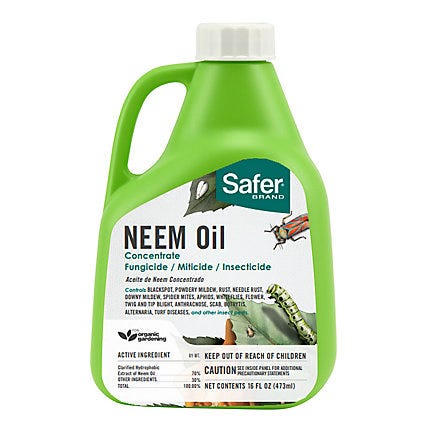
Boxwood and pear psyllids are the two most common psyllids, although there are over 3000 species of psyllids, including the potato or tomato psyllids. Use Safer® Brand Insect Killing Soap to eliminate psyllids.
So... What Are Psyllids?
Psyllids are very small, approximately 1/10" in length, and are black or green in color with transparent wings folded over their little bodies.
They resemble minute leafhoppers. Called "jumping plant lice," they have strong legs, which allow them to jump to a leaf or branch, since they are not good fliers.
Reproduction Patterns of Psyllids
Female psyllids lay eggs on the undersides of leaves.
The eggs hatch within two weeks and the nymphs go through 5 stages of development known as instars before they evolve into adults with wings.
This development process takes between 2-3 weeks to complete.
Psyllid's Habitat
Psyllids can be found throughout the world and live mostly on woody plants and certain fruit trees and vegetable crops, including pears, tomatoes, eggplants, and peppers.
Symptoms of Psyllid Damage

Psyllids start their plant feeding and juice sucking in the very first instar and continue through adulthood. When they feed, they may inject saliva that can harm or kill the plant.
Leaves and plants may appear deformed or galled when psyllids have been feeding on the plant.
Since psyllids produce honeydew, the presence of this substance may also indicate psyllids are present.
Psyllid Infestation
Leaves and plants may have a deformed appearance or they may look galled. If the infestation is severe enough, the plant may die.
The presence of honeydew may encourage the growth of fungi.
Psyllid Control

What?
The use of insecticidal soaps, including Safer® Brand Insect Killing Soap, and neem oil, such as Safer® Brand Neem Oil, are two excellent methods of controlling soft-bodied, garden insects such as psyllids.
How?
Insecticidal soap, made from potassium salt of fatty acids, works by penetrating and destroying the outer shell or membrane of the insect causing it to dehydrate and die.
Neem oil products work by suffocating the insect. Remember, when using Neem oil products, there is greater risk of phototoxicity (burning). Avoid using sulfur based fungicides within the active period (5-7 days) of the neem oil product. These two products combined, greatly increase the risk of plant burn.
Safer® Brand offers a variety of psyllid control products to help control and eliminate this garden pest and revive your plants. Products such as Safer® Brand Insect Killing Soap and Safer® Brand Neem Oil are the ideal products to eliminate psyllids from your garden.
When?
Since these formulas are contact killers and they do not persist in the environment, several applications may be needed for full control. As a general rule, much like watering, do not use these products in the peak of the day or when temperatures exceed 90 degrees F to avoid wilting or browning of the leaves.
Why Choose a Solution from Safer® Brand?
Unlike traditional synthetic chemicals, Safer® Brand Insect Killing Soap and Safer® Brand Neem Oil can be used around children and pets. They break down into their natural elements within 7 to 10 days leaving no residual impact on the environment.
They are highly preferable to chemical pesticides with toxins that can kill beneficial insects and cause long-term detrimental effects on the environment. Another negative effect of the chemical pesticides is the psyllid's possible buildup of resistance to the chemicals in the pesticides.
Natural Predators
What?
Natural enemies of the psyllid include lady beetles, lacewings, and parasitic wasps. These insects, partnered with a product like Safer® Brand Insect Killing Soap or Safer®& Brand Neem Oil are ideal to help control psyllid infestations in your organic garden.
How?
Lady beetles and lacewings find psyllids to be a delicious delicacy, and they will devour them without hurting your plants.
Parasitic wasps lay their eggs inside the psyllid's body eventually killing the host insect. Lure parasitic wasps to your garden by planting nectar or pollen producing plants.
When?
Lady beetles, lacewings, and parasitic wasps will appear shortly after the psyllids invade your garden.
Plant nectar or pollen producing plants as indicated by the temperature and climate zone of your area. Most greenhouses and garden centers can help you determine the right planting time for your area.
Environmental Controls
What?
By making sure the environment of your garden or trees is not favorable to psyllids, you can work on controlling any psyllids who invade those areas.
How?
Pruning the affected vegetation may be helpful in reducing psyllids. Cut off the leaves or parts of plantings that have psyllids on them. Make the area less favorable to ants who protect the psyllids in order to farm them for their honeydew excretions. Ants baits on the ground are a way to control the protective ants.
Check the soil content of your garden or around trees and plantings to make sure you do not have too much nitrogen in the soil. With good intentions, people may use fertilizer that has been highly enriched with nitrogen, only to be inadvertently creating an environment highly conducive to psyllids and their offspring.
Grow young plantings inside until they are strong enough to withstand a psyllid attack. If this cannot be done, use a covering for the planting or seedling outside in the garden while it is still young and vulnerable.
When?
Pruning of affected yellowing leaves should be done as soon as they are found. Ant baits and repellents can be used as soon as ants are seen running up and down trees and psyllids are found on the trees or nearby.
Plantings should be started indoors according to the instructions for the plants. This is usually in late winter to early spring, depending on your location.

